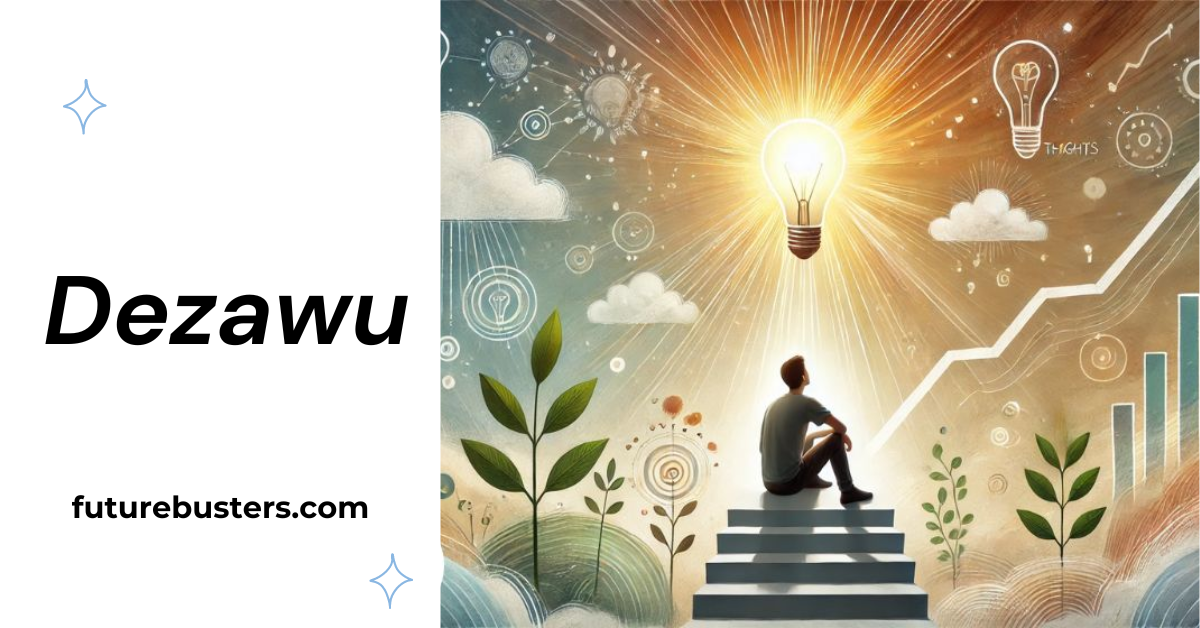Dezawu – The Fascinating Phenomenon of Familiarity

Have you ever experienced the eerie sensation that a current moment has happened before, as if you are reliving a scene from your own life? This peculiar feeling is known as “dezawu,” a term that blends “déjà vu” with a unique twist. Although déjà vu is a well-known phenomenon, dezawu is a more specific and intriguing variation. In this article, we will delve deeply into dezawu, exploring its nature, causes, and implications. We aim to provide a comprehensive understanding that not only surpasses existing information but also offers fresh insights into this fascinating experience.
What is Dezawu?
Dezawu is a term used to describe the strange sensation that a current experience or moment feels extraordinarily familiar, as if it has occurred before. This feeling is akin to déjà vu, but dezawu is often characterized by a more profound sense of repetition or precognition. Unlike déjà vu, which is a fleeting feeling of familiarity, dezawu might linger and influence your perception of reality.
The Concept of Déjà Vu
To fully grasp dezawu, it is essential to understand déjà vu. Déjà vu, a French term meaning “already seen,” refers to the uncanny sensation that one has experienced a situation before, despite its novelty. It is a common phenomenon, with about 60-70% of people reporting experiencing it at least once in their lives. While déjà vu is typically brief, lasting only a few seconds, it can leave a lasting impression on individuals.
The Science Behind Dezawu
Neurological Explanations
The exact cause of dezawu remains a mystery, but several theories attempt to explain this enigmatic experience. From a neurological perspective, dezawu might occur due to a temporary glitch in the brain’s memory system. Our brain processes and stores information in different regions, and sometimes, there might be a mix-up. This can result in the feeling that a new experience is a repeat of an old one.
- Temporal Lobe Activity: The temporal lobes, which are crucial for memory and recognition, might play a role in dezawu. If these areas become temporarily activated inappropriately, it could lead to a false sense of familiarity.
- Memory Overlap: Another theory suggests that dezawu arises from an overlap between short-term and long-term memory. When new information is processed, it might be mistakenly stored in long-term memory, creating a sense of déjà vu.
Psychological Theories
Psychological theories offer additional perspectives on dezawu. Some suggest that it might be related to our cognitive processes and perception of reality. For instance:
- Cognitive Dissonance: Dezawu might be a result of cognitive dissonance, where conflicting information or experiences create a sense of familiarity.
- Unconscious Memory: According to some theories, dezawu could arise from unconscious memories or experiences that surface without our awareness, giving us the illusion of repetition.
The Impact of Dezawu on Daily Life
Experiencing dezawu can have various effects on individuals, ranging from mild curiosity to profound existential reflection. Here’s how dezawu can impact daily life:
Personal Perception
- Sense of Repetition: People who experience dezawu might feel that their life is repeating itself, leading to a sense of monotony or predictability.
- Existential Reflection: Some individuals might view dezawu as a sign of deeper existential questions, pondering the nature of time, reality, and personal experiences.
Social and Psychological Effects
- Social Interactions: Dezawu can sometimes influence social interactions, as individuals might feel detached or disconnected from their surroundings due to the feeling of familiarity.
- Psychological Impact: For some, dezawu might be unsettling or confusing, leading to anxiety or stress. However, for others, it can be an intriguing phenomenon that sparks curiosity and exploration.
Common Misconceptions about Dezawu
Despite its fascinating nature, there are several misconceptions about dezawu. Here are a few common ones:
1. Dezawu is the Same as Déjà Vu
While dezawu shares similarities with déjà vu, it is a distinct experience. Déjà vu refers to a fleeting sense of familiarity, whereas dezawu might involve a more prolonged feeling of repetition or precognition.
2. Dezawu is a Supernatural Experience
Some people might view dezawu as a supernatural or mystical occurrence. However, scientific and psychological explanations suggest that it is a natural phenomenon related to memory and perception.
3. Dezawu is a Sign of Mental Health Issues
Experiencing dezawu does not necessarily indicate a mental health condition. While it can be disconcerting, it is typically a normal part of human experience and does not imply serious psychological issues.
Exploring Cultural and Historical Perspectives on Dezawu
Cultural Interpretations
Different cultures have various interpretations of experiences similar to dezawu. For instance:
- Eastern Philosophies: In some Eastern philosophies, feelings of repetition or familiarity might be linked to concepts of reincarnation or past lives.
- Western Mysticism: Western mystical traditions might interpret dezawu as a sign of spiritual awakening or a connection to other dimensions of reality.
Historical Accounts
Historically, experiences akin to dezawu have been documented in literature and philosophy. Ancient texts and writings often describe similar phenomena, although they were not labeled as dezawu.
Research and Studies on Dezawu
Scientific Research
While dezawu is less studied compared to déjà vu, some research explores its nature:
- Neuroscientific Studies: Researchers investigate the neurological basis of dezawu, focusing on brain activity and memory processes.
- Psychological Research: Psychological studies examine the cognitive and emotional aspects of dezawu, seeking to understand its impact on individuals.
Notable Studies and Findings
- Memory and Recognition: Some studies suggest that dezawu might involve a temporary overlap between memory systems, leading to a false sense of familiarity.
- Perception and Reality: Research on perception and reality explores how dezawu affects our understanding of time and experience.
Practical Tips for Dealing with Dezawu
Coping Strategies
If you experience dezawu, consider the following strategies to manage the sensation:
- Mindfulness Techniques: Practice mindfulness to stay grounded in the present moment and reduce anxiety related to dezawu.
- Journaling: Keeping a journal of your experiences can help you track and understand patterns in your feelings of familiarity.
Seeking Professional Help
If dezawu becomes distressing or impacts your daily life, consider seeking professional help. A mental health professional can provide support and guidance.
FAQs About Dezawu
What is dezawu?
Dezawu is the sensation that a current experience feels remarkably familiar, as if it has happened before. It is similar to déjà vu but often involves a more profound sense of repetition.
Is dezawu the same as déjà vu?
No, dezawu and déjà vu are related but distinct experiences. Déjà vu is a brief sense of familiarity, while dezawu might involve a more prolonged feeling of repetition or precognition.
What causes dezawu?
Dezawu might be caused by temporary glitches in the brain’s memory system, cognitive dissonance, or unconscious memories surfacing without awareness.
Can dezawu be a sign of mental health issues?
Experiencing dezawu is generally not a sign of mental health issues. It is a normal phenomenon, though it can be unsettling for some individuals.
How can I manage feelings of dezawu?
To manage dezawu, practice mindfulness, keep a journal, and seek professional help if it becomes distressing or impacts your daily life.
Are there cultural interpretations of dezawu?
Yes, different cultures interpret experiences similar to dezawu in various ways, such as through concepts of reincarnation or spiritual awakening.
What does scientific research say about dezawu?
Scientific research explores the neurological and psychological aspects of dezawu, focusing on memory processes and perception.
Conclusion: Embracing the Mystery of Dezawu
Dezawu is a fascinating phenomenon that invites us to explore the depths of our perception and memory. While it remains an enigmatic experience, understanding its nature through scientific, psychological, and cultural lenses can provide valuable insights. By embracing the mystery of dezawu, we can appreciate the complexities of human consciousness and the subtle ways in which our minds perceive and process reality.
Whether you encounter dezawu occasionally or find it a recurring experience, recognizing it as a natural part of human experience can help you navigate its effects with curiosity and insight.











